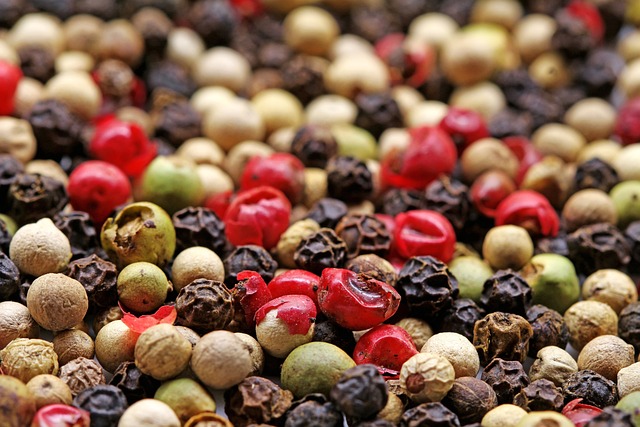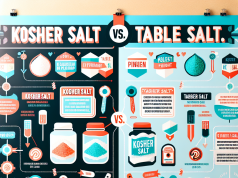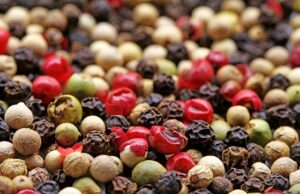Contents
White Pepper vs. Black Pepper: Which is Right for Your Dish?
When it comes to enhancing the flavors of your dishes, pepper plays a crucial role. However, the choice between white pepper and black pepper can often leave you wondering which one is best suited for your culinary creation. Understanding the differences between these two popular spices can help you make an informed decision.
The Flavor Profile: Black pepper is known for its bold, pungent, and slightly spicy taste. It adds a warm and robust flavor to dishes. On the other hand, white pepper is slightly milder and less aromatic. It provides a subtle and earthy flavor with hints of heat.
The Appearance: Black pepper, as the name suggests, is black in color and typically comes in the form of coarsely ground or whole peppercorns. White pepper, on the other hand, is light beige or cream-colored and is usually finely ground.
The Usage: Black pepper is versatile and widely used in various dishes, ranging from savory to sweet. It is a common ingredient in marinades, rubs, soups, and sauces. White pepper, due to its milder taste, is considered particularly suitable for dishes where you want to avoid visible dark specks, such as light-colored or creamy dishes like mashed potatoes or creamy soups.
Health Benefits: Both white and black pepper offer numerous health benefits. They contain antioxidants, help improve digestion, and have antimicrobial properties. Black pepper also contains a compound called piperine, which has been linked to potential anti-inflammatory effects.
Conclusion: Ultimately, the choice between white pepper and black pepper depends on the flavor profile you desire in your dish and its visual appearance. While black pepper adds a bolder taste and is versatile in its usage, white pepper provides a milder flavor, making it suitable for specific types of dishes. Experimenting with both can help you discover your personal preference and elevate your culinary creations.
White Pepper vs. Black Pepper: Which is Right for Your Dish?
Overview of White Pepper and Black Pepper
White pepper and black pepper are two commonly used spices that add flavor and aroma to a wide variety of dishes. While they both come from the same plant, Piper nigrum, the difference lies in how they are processed and their taste profiles. In this blog post, we will explore the characteristics of white pepper and black pepper, and help you decide which one to choose for your culinary creations.
What is White Pepper?
White pepper is made from fully ripe peppercorns that are soaked in water and then the outer layer is removed, leaving only the inner seed. The seeds are then dried, resulting in a white or cream-colored pepper with a milder and less complex flavor compared to black pepper. It is perfect for delicate dishes where a strong pepper flavor may overpower other ingredients.
What is Black Pepper?
Black pepper is made from unripe green peppercorns that are left to ferment and then dried until they turn black. This process enhances the rich, pungent, and slightly spicy flavor of the spice. Black pepper is versatile and can be used in a wide range of dishes, from soups and sauces to grilled meats and roasted vegetables. Its bold flavor adds depth and complexity to the dish.
Key Differences between White Pepper and Black Pepper
While white pepper and black pepper share similarities, it’s important to note the differences that set them apart. Some of the key differences are:
- Flavor: White pepper has a milder taste with subtle notes, while black pepper has a stronger and spicier flavor.
- Color: White pepper is pale or cream-colored, while black pepper is dark brown or black.
- Texture: White pepper powder is smooth and fine, whereas black pepper powder is coarser.
- Usage: White pepper is commonly used in light-colored dishes like white sauces, mashed potatoes, and soups, whereas black pepper is more versatile and can be used in almost any savory dish.
Which Pepper Should You Choose?
The choice between white pepper and black pepper depends on the specific dish and the intensity of flavor you desire. Here are a few pointers to help you decide:
- If you want to add a subtle pepper flavor without altering the color of your dish, opt for white pepper.
- For dishes that require a more pronounced and robust pepper taste, black pepper is the way to go.
- Consider the color of your dish: white pepper blends well with light-colored foods, while black pepper works best with darker-colored dishes.
Remember, both white pepper and black pepper can be used interchangeably in many cases, so don’t be afraid to experiment and discover your personal preference.
Conclusion
In summary, white pepper and black pepper have distinct characteristics that make them suitable for different dishes. White pepper offers a milder flavor and lighter color, while black pepper brings a strong and spicy kick to your culinary creations. Understanding their differences will help you make an informed decision based on your dish’s requirements. Experiment with both to determine which pepper best complements your cooking style and taste preferences.
To learn more about the different types of spices and seasonings, check out our blog post on the importance of choosing the right spices.
Frequently Asked Questions
1. What is the main difference between white pepper and black pepper?
White pepper and black pepper come from the same plant, but they are processed differently. Black pepper is made from fully ripe berries, whereas white pepper is produced from the seeds of the ripe berries after removing the outer skin.
2. Does white pepper taste different from black pepper?
Yes, white pepper has a milder and slightly earthier flavor compared to black pepper. It also lacks the pungent and aromatic notes found in black pepper.
3. Can I use white pepper as a substitute for black pepper?
Yes, you can use white pepper as a substitute for black pepper, but be aware that it may alter the taste and appearance of your dish. It is best to use white pepper in recipes where you prefer a subtler flavor or when you want to maintain a lighter color.
4. Which dishes are best suited for white pepper?
White pepper is commonly used in light-colored dishes such as white sauces, mashed potatoes, cream-based soups, and seafood recipes. It blends well with ingredients without affecting the overall appearance of the dish.
5. When should I choose black pepper over white pepper?
Black pepper is more often preferred in recipes where a stronger, more distinct flavor is desired. It works well in darker dishes, such as stews, grilled meats, pasta sauces, and marinades.
What is White Pepper?
White pepper is a type of seasoning that comes from the dried seeds of the Piper nigrum plant. It is commonly used in cooking to add flavor and heat to various dishes.
Benefits of Using White Pepper:
White pepper offers several benefits when used in cooking:
Enhances Flavor
White pepper imparts a distinct and more subtle flavor compared to black pepper. It adds a mild spicy kick to soups, sauces, and marinades, enhancing the overall taste of the dish.
Improves Digestion
White pepper is known for its digestive properties. It contains an alkaloid called piperine, which stimulates the production of digestive enzymes, aiding in the breakdown of food and promoting a healthy digestive system.
Anti-inflammatory properties
Research suggests that white pepper possesses anti-inflammatory properties due to the presence of piperine. Regular consumption of white pepper may help reduce inflammation and relieve symptoms associated with inflammatory conditions.
Rich in Antioxidants
White pepper contains various antioxidants that help protect the body against oxidative stress. These antioxidants may help reduce the risk of chronic diseases and support overall well-being.
Outbound Link:
To learn more about the history and uses of white pepper, visit the White Pepper Wikipedia page.
White Pepper vs. Black Pepper: Which is Right for Your Dish?
Introduction
- Both white pepper and black pepper come from the same plant species, but undergo different processing methods.
Appearance and Flavor
- Black pepper has a stronger, more pungent flavor and a dark color, making it a popular choice for savory dishes.
- White pepper has a milder and slightly earthy flavor with a pale white color, often preferred for dishes where aesthetics matter.
Grinding Process
- Black pepper is made by drying unripe pepper berries, while white pepper is produced by removing the outer layer of ripe berries before drying.
Usage and Culinary Applications
- Black pepper is commonly used in meat-based dishes, stews, gravies, and in seasoning rubs.
- White pepper is ideal for light-colored dishes, creamy sauces, soups, and dishes where its flavor won’t overpower other ingredients.
Health Benefits
- Both types of pepper have similar health benefits, such as aiding digestion, improving nutrient absorption, and reducing inflammation.
- White pepper is often recommended for individuals with digestive issues, as it is believed to have a less irritating effect on the stomach.
Conclusion
- Choosing between white pepper and black pepper depends on the flavor profile and visual appeal you want to achieve in your dish.
- Experiment with both types to find the one that best complements your recipes.








































